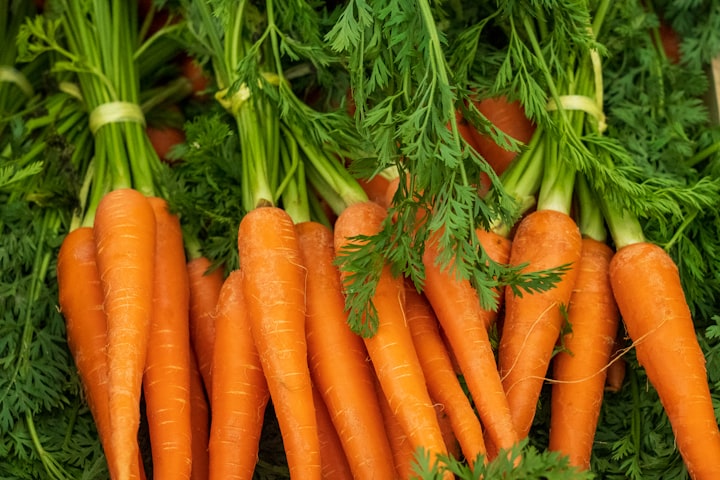The benefits of carrots
the benefits of carrots

Benefits of carrots: Here are the most important and prominent ones
The benefits of carrots are many and varied, so what are the most important ones? And how can you benefit from carrots to enhance your health and protect you from diseases?
The benefits of carrots are many and varied, as it contributes to fighting diseases, and the power of carrots in protecting against various diseases stems from its richness in important nutrients, such as beta-carotene.
The benefits of carrots
The benefits of carrots that stem from their contents of nutrients are many, here is a list of the most important ones:
Rich in beta-carotene
Beta-carotene is a family of carotenoids, and carotenoids are a large family of chromosomes responsible for the yellow, orange, and red color in many vegetables and fruits, as these beta-carotenoids help:
Reducing the chances of several diseases, such as: heart disease, stroke, cancer, and blindness.
Slow down the aging process.
Reducing the complications of diabetes.
Improve lung function.
Beta-carotene is the best-known among the carotenoids and is also used as a major source of vitamin A, which is essential for the following:
to see.
To maintain the proper functioning of the immune system.
for proper growth.
To maintain healthy skin and reduce the risk of cancer

Maintaining healthy eyes
The common saying about the ability of carrots to strengthen eyesight is not just a myth, but rather a fact, as vitamin A, found in high concentrations in carrots, helps protect the eyes from diseases in general, and to protect them from any damage that may cause blindness in particular.
However, we should note here that taking advantage of carrots to improve vision does not occur unless the person already suffers from a significant deficiency in his vitamin A levels.
Fighting cancer
The beta-carotene found in carrots encourages communication between cells, which may help prevent cancer. Improper communication between cells may be one of the causes of overgrowth of cells leading to cancer. cell, allowing information to be transferred from one cell to another.
Diabetes control
The high content of carrots in various antioxidants makes it one of the vegetables that help improve blood sugar levels and keep them under control, especially since carrots have a very low glycemic index.
Promote the activity of tumor predator cells
Beta-carotene also acts as an antioxidant, and so may encourage the activity of tumor predator cells called natural killer cells. .
Strengthening the immune system
Carrots contain a variety of nutrients that the immune system needs and that help to strengthen it, such as: vitamin C, and various antioxidants, and vitamin C may help protect the body from various diseases, such as: influenza, a common cold.
Correction of DNA defects
Beta-carotene has been found to encourage the action of enzymes that correct defects in DNA, as carrot juice rich in beta-carotene has been found to be very effective in this task.
Lower bad cholesterol
Among the benefits of carrots, beta-carotene also contributes to reducing the level of cholesterol in the blood, as it was found to help control the activity of enzymes related to the production of cholesterol. Carrots also contain other components that contribute to lowering cholesterol levels in the blood, such as dietary fiber.
It was found that eating two large carrots per day for a week helped reduce cholesterol levels in the blood by 11%, and it was also found that increasing the intake of carrots contributes to reducing the risk of stroke.
Fighting heart disease
Another benefit of carrots is that it contains a type of beta-carotene that contributes significantly to maintaining heart health and protecting it from the risk of some diseases, as it was found that consuming this type of compound may be associated with a lower incidence of heart disease.

The benefits of carrots for the heart also stem from its high potassium content, which makes eating carrots regularly help lower high blood pressure.
A source of vitamins
One of the benefits of carrots is that it is rich in vitamins. In terms of traditional food ingredients, carrots are a source of:
Potassium: It is a mineral that contributes to reducing the risk of high blood pressure and heart disease as well as to bone strength.
Group B vitamins: necessary for energy production in the body and help prevent birth defects in the nervous system in the fetus and reduce homocysteine levels in the blood, which reduces the risk of heart disease.
Beta-Carotene: Helps reduce the risk of cancer and is used as a precursor to the production of Vitamin A, which is essential for vision, maintaining the immune system, healthy growth, and maintaining healthy skin.
Vitamin C: It is an effective antioxidant that helps reduce the risk of heart disease, stroke, cancer, and possibly cataracts and diabetes complications.
Vitamin K: It is essential for blood clotting and contributes to the strengthening of bones.
Vitamin E: A powerful antioxidant that helps prevent heart disease and the aging process, proper immune system functioning, cancer prevention and skin health.
Dietary fiber: contributes to the regulation of the work of the digestive system and slows down the absorption of substances from food, such as: sugar and cholesterol.

nutritional content in carrots
Carrots contain a wide range of important nutrients, including:
energy.
carbohydrates.
proteins.
Sugar.
vitamin C.
calcium.
phosphorous.
Dietary fiber.
magnesium.
Iron.
Vitamin A.
zinc.
It is worth noting that eating one cup of shredded carrots per day can provide the body with the full daily needs of vitamin A, and carrots are rich in beta-carotenoids and group B vitamins.
Carrot damage
Despite the many benefits of carrots, there are some harms that may result from eating it, including:
Elevated liver enzymes.
Vitamin A toxicity.
allergic reaction
High blood sugar.
Change the color of the skin.






Comments
There are no comments for this story
Be the first to respond and start the conversation.